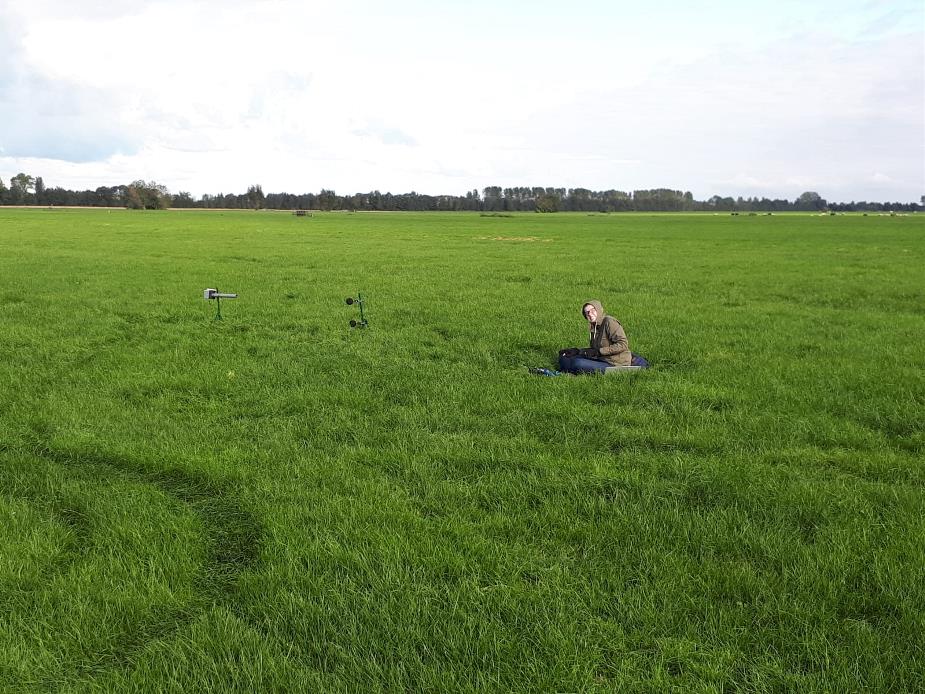Sitting still for an hour in a meadow at minus five
16 May 2022
This is probably not the first thing that comes to mind when you think of an internship at a consultancy firm. For Renske Witzier, who studies Applied Physics, it was practice. During her third year internship at DGMR...

This is probably not the first thing that comes to mind when you think of an internship at a consultancy firm. For Renske Witzier, who studies Applied Physics, it was practice. During her third year internship at DGMR, she conducted research on acoustics. She would take her self-built measuring set to a meadow, but also to an artificial grass field, a gravel path, a green car park, the beach and even a green roof. Her internship also yielded another unexpected outcome. She won the NNV HBO Young Talent Award 2022 with it.
So why all these measurements, you may ask. Well, it's like this. Renske's assignment was to record the impedance of different surfaces. Simply put: this is the degree to which sound is attenuated by the environment. Renske: 'You probably have shouted 'hello' when walking through a concrete tunnel or underpass. The immediate echo that follows, is caused by the reflection of the sound. Would the echo still exist if the tunnel were completely covered with grass? No. And that is because of impedance.’
Sound waves and soil characteristics
'Now let me give you the technically correct explanation of soil impedance,' Renske continues. 'As soon as the sound reflects off the ground, the sound wave undergoes a phase shift. The soil properties determine the extent of this. The reflected sound wave then interferes with a sound wave that is not reflected, and the two attenuate each other.' Of course an average student doesn't know about all this right away. Renske first had to study this theme. During her degree programme, she had studied some acoustics, but this specific topic was not covered.
Out and about with a measuring set
So Renske's internship started with a lot of reading. She then used a speaker and two microphones to create a measuring set, which she carried around to all kinds of soil types. She converted the collected measurements into a value between 0 and 1, the so-called soil factor. To be clear: the tunnel has value 0: acoustically loud, no impedance. Renske: 'In the end I made a chart with soil types and the measured soil factor. This soil factor can be used in calculation models that determine the noise load on residences or in nature for the purpose of legislation and/or to determine health parameters."
The internship was good for my self-confidence. I did everything myself
It had never even occurred to her that she would win a prize for her internship. Renske: 'Of course I knew I had written a good report, but to be honest I didn't even know the award existed. It's great for personal marketing though! I also really enjoyed my internship, especially the balance between desk work and going out to conduct measurements. Although the latter was very cold sometimes, in the middle of winter, haha. The internship has also been good for my self-confidence. At school, you conduct your lab work in pairs and I did this all by myself.'
Maintaining focus and overview
And she should be very proud of that. Ivo Wenneker, her THUAS supervisor, says that Renske handled all the challenges she faced during her research extremely well. 'For example, there are always measurement uncertainties in this kind of field measurements with environmental factors that are difficult to influence, or there was the complicated system she had to use to process the results. Renske mentioned all the challenges but never let these get her down. She knew how to maintain focus and overview.’
First party and travel, then look for a job
Renske is now working on her graduation internship. She will be ready in a month and a half. And then what? "First we have to party and travel. I am going to drive around Iceland with a friend in a car with a rooftop tent. And in September I am leaving for a five-week road trip to the North Cape and back. After that I want to apply for a job, initially at the DGMR. If that does not work out, I will look into other consultancy agencies. I now think I would like to do something with acoustics, building physics and/or the environment. Applying my own chart in the field, that would be nice too.’
Do you also have an interest in acoustics, photonics, or nanotechnology? Take a look at the Applied Physics website at The Hague University of Applied Sciences